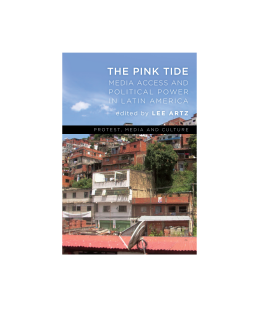
Additional Information
Book Details
Abstract
Over the last two decades, military and authoritarian regimes in Latin America have receded as indigenous social movements and popular protests have demanded and won peaceful transitions to democratically-elected governments. Across the entire Southern hemisphere, democracy arose with a radical flourish, bringing dramatic changes in politics, education, civil society, and the media. Historically, revolution in Latin America has been depicted as civil war, violent conflict, and armed resistance, but recent social change has resulted from the political power of mass social movements reflected in elections and government policy change rather than guerrilla insurgencies.
The Pink Tide investigates the relationship between media access and democracy, arguing that citizen participation in broadcasting is a primary indicator of the changed social relations of power in each country. Democracy has meaning only to the extent that citizens participate in discussion and decisions. This book demonstrates that participation in public communication is a prime ingredient in democratic action and citizen self-organization, a vital means for constructing new cultural practices and social norms.
Lee Artz, a former machinist and steelworker, is Professor of Media Studies at Purdue University Northwest. He has published ten books (including Global Entertainment Media, Marxism and Communication Studies, and The Media Globe) and scores of chapters and journal articles on international media, cultural hegemony, and democratic communication. He is a founder and research fellow at Purdue Northwest’s Center for Global Studies.
The role of politics and the media in Latin America is often disregarded in Western debates. Given that the Left in Latin American politics in general is stronger than in Europe and North America, one can learn important lessons by engaging with this part of the world. 'Pink Tide: Media Access and Political Power in Latin America' is an excellent collection that sheds light on this blindspot. It is a must-read introduction to the role of participatory democracy and public access media in Latin America. One of its strengths is that it both presents general analyses as well as six country studies.
Christian Fuchs, Professor, University of Westminster
An important work for those interested in different perspectives that explain the strengths, contradictions and retreat of the pink tide in Latin America amid the return of “neoliberalism”, the rise of extreme right wing forces and the disillusionment with democracy. Chapters examine media power, the left/right dichotomy, media policies and public access media, investing in the possibility of a renewal of social democracy and progressive forces for social change throughout the continent.
Carolina Matos, Lecturer in Sociology, City, University of London
This is an important book for anyone who wants to understand the impact of the media in Latin American politics. The book also offers an excellent explanation of the role participation, civil society, ideology, populism and power in Latin America.
Natasha Erzow, Senior Lecturer, International Development Program, Department of Government, University of Essex
This volume is an excellent critical and thought provoking analysis of the media reforms of the Pink Tide governments of Latin America - essential reading for all those interested in media control and people's rights to participate in all aspects of communication. Highly recommended.
Peter Ross, Senior Lecturer in Spanish and Latin American Studies, University of New South Wales, Sydney
Lee Artz has collected in The Pink Tide important, thought-provoking, and diverse communications experiences of Latin American Left governments, societies and social movements that set different initiatives to contain neoliberal policies. This book gives us a valuable insight into de-commodified communications policies and practices across five South American countries and two regional overviews.
Rodrigo Gomez, Professor, Universidad Autónoma Metropolitana-Cuajimalpa, Mexico
Table of Contents
| Section Title | Page | Action | Price |
|---|---|---|---|
| Contents | 9 | ||
| Introduction | 11 | ||
| 1 Media, Power, and Democracy in Latin America | 19 | ||
| 2 Venezuela | 67 | ||
| 3 Bolivia | 81 | ||
| 4 Ecuador | 105 | ||
| 5 Uruguay | 129 | ||
| 6 Alternative Media in Pink Tide Latin America | 149 | ||
| 7 Brazil | 169 | ||
| 8 Latin America Communicative Sovereignty and the Cultural Policies of ALBA, CELAC, and UNASUR | 185 | ||
| 9 The Ebbs and Flows of Revolution | 203 | ||
| Index | 221 | ||
| Contributors | 225 |
